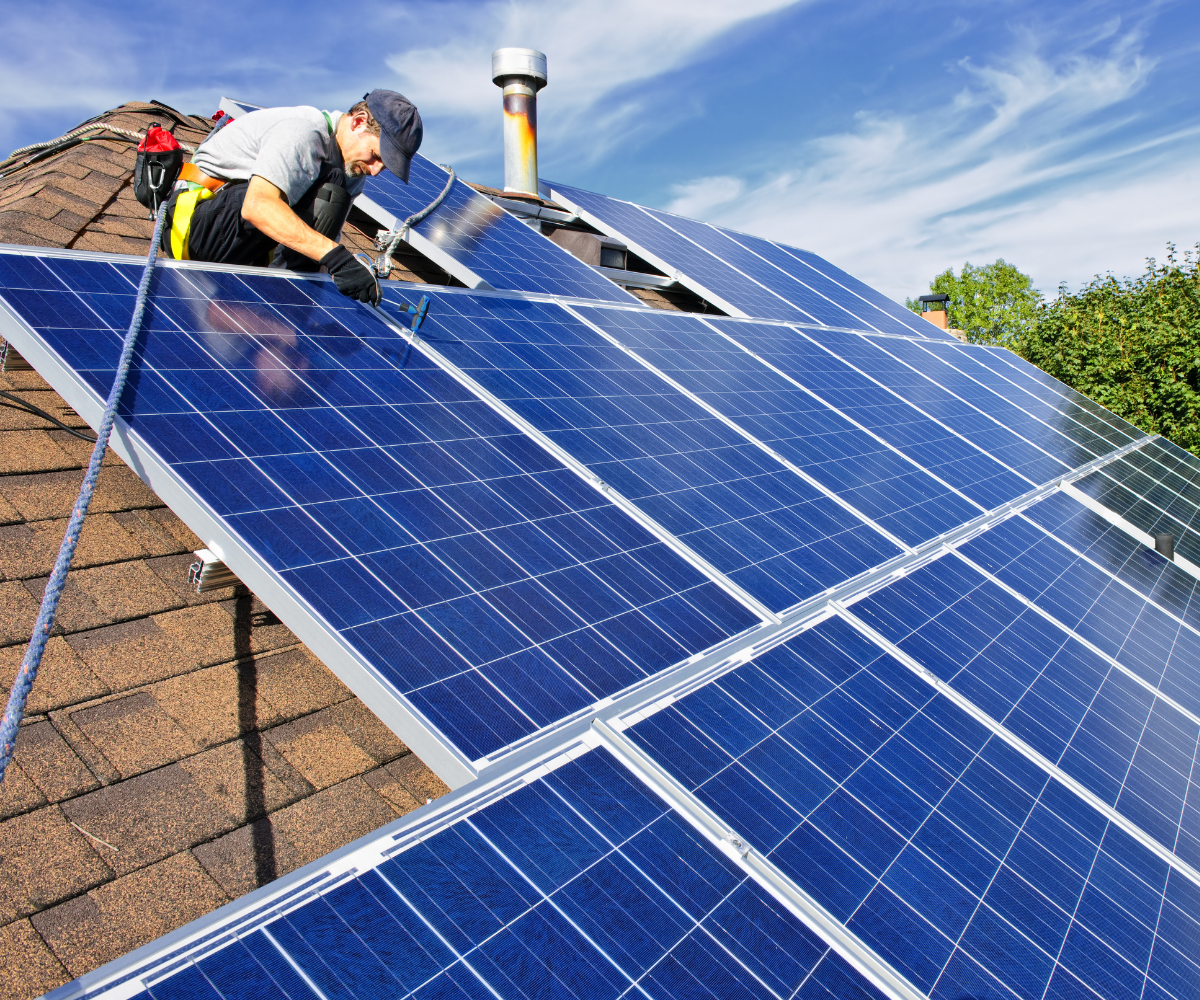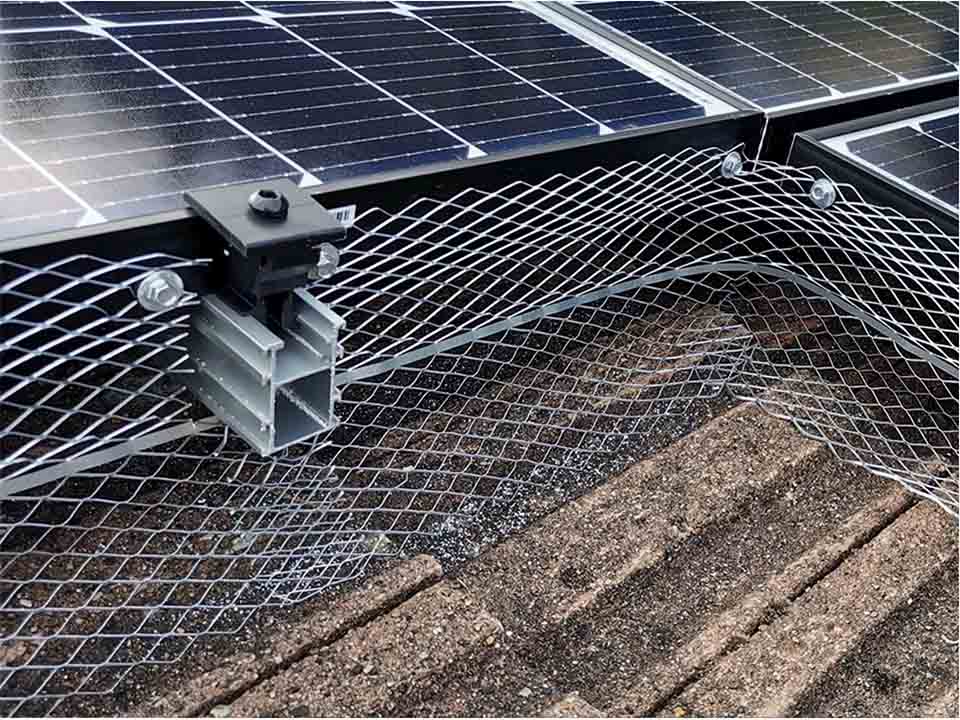Rising energy bills and the UK’s race to net zero means solar panel systems are a common sight across the country. By adding a battery, they can work even harder for you. Solar battery storage is like a bank account for your solar energy system. Here, we explain how it works, why it’s beneficial, and the added value to your home or business.
What is solar battery storage?
Solar battery storage is, as the name suggests, a battery that stores solar power you generate. The electricity is kept in the battery and used when needed (i.e., when your panels aren’t generating any, such as at night or on overcast days).
The following elements make the system:
- Solar panels produce direct current (DC) electricity from the sun
- An inverter/controller changes the DC current to alternating current (AC) to power your home and/or export
- A battery (usually near the inverter, indoors or in a sheltered outdoor space) to store surplus energy
Battery kicks in when solar generation dips and is used rather than importing from the grid to power your cooker, lighting or EV charger
Why should you add a battery?
1. Maximise Your Solar Investment
If you don’t have a battery and your solar panels produce more energy than you can use, it’ll go into the grid. You’ll be paid a tiny export tariff but then need to buy expensive grid electricity when the panels aren’t working.
A battery means you can capture 70% or more of your solar generation and use that later instead of the grid supply.
A UK report found the average home could reduce their electricity bills by 86% by installing a battery.
2. Protection Against Grid Price Rises and Avoid Shortages
Energy prices have become highly volatile over the past decade, so locking in your own solar generation via battery storage provides some protection from price spikes. If you choose batteries with emergency power supply (EPS), you can also have backup power during outages to keep fridges, medical equipment, heating systems, etc. running.
3. Greater Earnings Via Export Tariffs
Solar tariff schemes such as the Smart Export Guarantee (SEG) mean that surplus solar electricity you export will net you a reasonable tariff. But with battery storage, you can use that exported energy (stored in your battery) later instead of importing grid power, saving you even more. It will also increase the amount of solar energy you have to export.
4. Lower Carbon Footprint
Every kWh you store and use instead of grid power reduces your fossil fuel-powered grid energy consumption. It’s one of the most effective ways to tackle climate change and help the government meet its net zero targets. E.ON estimates that battery storage capacity will need to increase by 500% by 2030.
5. Increase Your Home Value
Solar panels are thought to increase property values by 10–14%, depending on the survey, which could mean £30,000 extra in some cases. And adding a battery is likely to further boost appeal to eco-conscious home buyers.
How does a solar battery work: A typical day
Morning: Panels generate electricity, which the home consumes, and the surplus is used to charge the battery.
Afternoon: Battery is fully charged and further solar generation is exported.
Evening/Night: Battery discharges to power home appliances, and no grid electricity is used.
The following morning: The battery is still not empty, and it tops up before importing from the grid.
Battery will eliminate most (60-80%) grid imports in a correctly sized system (~5 kWh for a UK 3‑bed house with average solar generation).
Solar battery storage types
The main types of solar batteries:
Lead-acid batteries
- Pros: Low cost, reliable, easy to recycle.
- Cons: Heavy, bulky, requires maintenance, 3–7 years lifespan.
Lithium-ion batteries
- Pros: Compact, efficient, and long-lasting (10-12 years lifespan).
- Cons: Higher upfront cost, recycling still developing.
Sodium-ion batteries
- Pros: Cheaper, safer materials, more sustainable.
- Cons: Lower energy density, less mature than lithium-ion.
Flow batteries (and other emerging tech)
- Pros: Extremely long lifespan, good for scalable storage.
- Cons: High initial cost, rare for residential.
In the UK, lithium-ion is currently the most practical for most homeowners. It offers a good mix of performance, space, and return on investment.
Sizing & costs
A typical UK family house will need 5-6 kWh, battery storage only (standalone) costs on average £5,000 for 5 kWh. If purchased as part of a new solar installation, it is likely to cost £2,000–3,000 extra. Battery lifespan is generally 10-12 years (lithium-ion).
This means long-term savings outweigh cost most times.
Summary:
- 5 kWh battery ≈ £5,000
- Paired solar system add £2,000-3,000
- Lifespan: 10-15 years
- Typical payback: 5-7 years via reduced bills, export credits, home value
Installation & maintenance
An installer will:
- Find an indoor or sheltered outdoor location (garage or exterior wall usually) with fire protection (if inside)
- Connect the battery to your existing inverter to reduce power loss.
- Set up a monitoring system to show you how well your battery is performing and what your self-consumption rate is.
Lithium-ion battery storage requires little to no maintenance. Most of the monitoring will be through your smart meter/app. A controller/inverter inspection every few years is advisable.
Why Eden Power Ltd?
Eden Power Ltd specialises in the design and installation of fully integrated solar and battery systems:
- Expert system sizing to ensure you get the correct battery size
- Inverter optimisation for best efficiency and smart home compatibility
- Monitoring system setup so you can track your self-use and savings
- Ongoing support and future upgrade options, such as EPS for backup power
With energy resilience increasingly high on the agenda (and the UK government working to enable a cleaner, smarter electrical grid), now is a great time to add battery storage to your solar panels.
Final thoughts
Solar panels are already an intelligent investment for most homes and businesses. Solar battery storage takes your solar energy system from being a good source of backup power to one that:
- Reduces your reliance on the grid
- Cuts your energy bills by up to 86%
- Insulates you from volatile energy prices
- Protects against outages
- Boosts your home value and reduces carbon footprint
With solar battery storage payback periods decreasing rapidly, export tariffs increasing, and battery technologies maturing, it’s a win-win-win situation.
Get in touch with Eden Power Ltd if you’d like to learn more about solar battery storage for your home or business.
Our experts will design a bespoke system to meet your objectives, delivering lower bills, energy independence, and carbon-conscious living.
Let’s create a brighter, cleaner future, together.











